Matt Bentley’s first paper with a Bournemouth University Address was published in ICES Journal of Marine Science on 13 October 2015
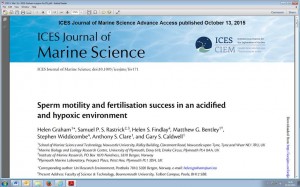
Latest research and knowledge exchange news at Bournemouth University
Matt Bentley’s first paper with a Bournemouth University Address was published in ICES Journal of Marine Science on 13 October 2015

I have recently returned from a Santander sponsored trip to Glucksman House Ireland, New York University for a series of meetings with key academics within the department of Irish Studies Professor Miriam Nyham, and Professor Mick Moloney at NYU. I attended a number of events to connect with key stakeholders in the Irish events sector in New York. Having recently received funding from the BU Fusion Staff Mobility and Networking Fund (SMN) I plan to continue my networking at NYU performing research regarding my PhD topic ‘The role of identity and place attachment for Irish Diaspora audiences at Irish cultural events’. I am very excited about returning to NYU in Spring next year to meet with my contacts at Glucksman Ireland House, NYU and to perform my Ethnography field research at the Irish Arts Center NY, the Irish Center in Long Island and the range of events at Glucksman Ireland House NYU with many commemorative Irish cultural events. For more information about this project, please contact: Pearl Morrison morrisonp@bournemouth.ac.uk
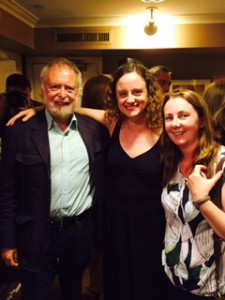
Staff are invited to submit applications for an undergraduate research assistant (URA).
The Undergraduate Research Assistantship programme aims to support at least 50 undergraduate students to work under the guidance of an experienced academic in a research position that is directly related to their career path and/or academic discipline.
The staff application deadline has been extended to Sunday 25th October.
To apply for a URA, please complete the following URA Application and send to urap@bournemouth.ac.uk by midnight on Sunday 25th October. The following selection criteria will help your application.
If you have any questions, please contact Rachel Clarke, KE Adviser (KTP) on 01202 961347 or email clarker@bournemouth.ac.uk
To support academic colleagues in depositing their research open access the BURO Team in Library and Learning Support have produced a brand new guide – Open Access and Depositing your Research. Colleagues will find this guide particularly useful if you are…
Guidance is provided in the following key areas: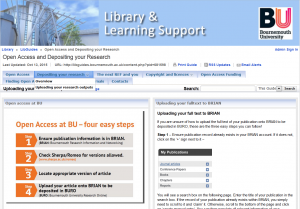
Please note: this guide is in development and more sections will soon be added. The guide will shortly appear on the deposit page in BRIAN. The BURO Team welcome any feedback.
Please note: during this short period around the Mock REF/internal review exercise increased levels of deposit mean the BURO Editorial Team may take a little longer than usual to make your research open access and respond to any queries about your outputs. In recognition of this the online nomination form provides an option to indicate that you have submitted the your full text to BURO via BRIAN even if you are unable to provide a BURO web link for each of your outputs at the time of form completion.
![]() Yesterday BMJ Open published our latest article on the weight management in obese men, under the title A qualitative evidence synthesis on the management of male obesity.[1] To the best of our knowledge, this is the first synthesis of qualitative studies investigating men’s perceptions and experiences of weight management services. The interdisciplinary study was conducted between the three research centres at the University of Aberdeen, namely the Health Services Research Unit (HSRU), the Health Economics Research Unit (HERU) and the Rowett Institute of Health & Nutrition, the University of Stirling’s NMAHP Research Unit, the University of Edinburgh’s Scottish Collaboration for Public Health Research & Policy (SCPHRP) and Bournemouth University.
Yesterday BMJ Open published our latest article on the weight management in obese men, under the title A qualitative evidence synthesis on the management of male obesity.[1] To the best of our knowledge, this is the first synthesis of qualitative studies investigating men’s perceptions and experiences of weight management services. The interdisciplinary study was conducted between the three research centres at the University of Aberdeen, namely the Health Services Research Unit (HSRU), the Health Economics Research Unit (HERU) and the Rowett Institute of Health & Nutrition, the University of Stirling’s NMAHP Research Unit, the University of Edinburgh’s Scottish Collaboration for Public Health Research & Policy (SCPHRP) and Bournemouth University.
Studies published between 1990 and 2012 reporting qualitative research with obese men, or obese men in contrast to obese women and lifestyle or drug weight management were included. The studies included men aged 16 years or over, with no upper age limit, with a mean or median body mass index of 30 kg/m2 in all settings. In total 22 studies were identified.
Health concerns and the perception that certain programmes had ‘worked’ for other men were the key factors that motivated men to engage with weight management programmes. Barriers to engagement and adherence with programmes included: men not problematizing their weight until labelled ‘obese’; a lack of support for new food choices by friends and family, and reluctance to undertake extreme dieting. Retaining some autonomy over what is eaten; flexibility about treats and alcohol, and a focus on physical activity were attractive features of programmes. Group interventions, humour and social support facilitated attendance and adherence. Men were motivated to attend programmes in settings that were convenient, non-threatening and congruent with their masculine identities, but men were seldom involved in programme design.
The paper concluded that men’s perspectives and preferences within the wider context of family, work and pleasure should be sought when designing weight management services. Qualitative research is needed with men to inform all aspects of intervention design, including the setting, optimal recruitment processes and strategies to minimise attrition. This paper grew out of the larger ROMEO study which was published in our full HTA (Health Technology Assessment) report, which is also freely available on line, click here! [2]
CMMPH
Reference:
29-30 January 2016
Thanks to Fusion Investment funding I will be co-running with Dr Paul Stapleton (QUB) a symposium exploring Interagency in Technologically-Mediated Performance. Despite a growing community of people creating digital musical instruments and a growing associated academic field, there has been little recognition within these communities of the associated approaches to a Philosophy of Technology that examines human-technology interactions from a variety of social, political and philosophical perspectives.
This event will bring together researchers and industry representatives from the fields of Philosophy of Technology and Digital Musical Instrument (DMI) design to establish an overview of best practice of new musical instrument creation and set out a road map for future research in this area. The symposium will feature talks by five keynote speakers that are all internationally recognised experts in their fields. Workshop and discussion will form a large part of the symposium in order to have time to fully establish an overview of best practice and to define the future research agenda.
The symposium will run 29th and 30th of January 2016. There will soon be a call for attendance, places will be limited so sign up quick if you are interested. There will also be a short concert on Friday 29th Jan from 17:30- 18:30 attendance for this is open to everybody.
Tom Davis

Professor Edwin van Teijlingen (CMMPH) has been invited to present a key note speech at the Kennispoort Verloskunde conference in Utrecht, the Netherlands in January 2016. He will be speaking about ‘Dealing with risk in maternity care: the social versus medical model’. The presentation is based on a number of publications around the sociological topic of the medical/social model of childbirth. [1-3]
 One of the ways sociologists analyse health and health care is in terms of a ‘medical’ versus a ‘social’ model, or in this field, a midwifery model. As pregnancy and birth are biological and physiological events which are very much embedded in a social and cultural setting, these are good examples to highlight the use and misuse of the medical and social model. Modern Western society has a slightly paradoxical view of pregnancy. On the one hand, the average woman in childbirth is not ill because pregnancy is not an illness. On the other hand, pregnant women are deemed to need a lot of health care throughout pregnancy and childbirth. Making the distinction between a medical and a social model of a social phenomenon is not exclusive to midwifery. Over the past decades researchers have pointed to the existence of a medical and social model in alcohol misuse, obesity, sex, eating disorders, infertility treatment, to name but a few phenomena.
One of the ways sociologists analyse health and health care is in terms of a ‘medical’ versus a ‘social’ model, or in this field, a midwifery model. As pregnancy and birth are biological and physiological events which are very much embedded in a social and cultural setting, these are good examples to highlight the use and misuse of the medical and social model. Modern Western society has a slightly paradoxical view of pregnancy. On the one hand, the average woman in childbirth is not ill because pregnancy is not an illness. On the other hand, pregnant women are deemed to need a lot of health care throughout pregnancy and childbirth. Making the distinction between a medical and a social model of a social phenomenon is not exclusive to midwifery. Over the past decades researchers have pointed to the existence of a medical and social model in alcohol misuse, obesity, sex, eating disorders, infertility treatment, to name but a few phenomena.
References:
Dr. Miguel Moital, Principal Academic in Events Management in the Department of Events & Leisure, Faculty of Management, has just seen his paper published in the Current Issues in Tourism journal reach the 10.000 views mark. The paper has been leading the most viewed ranking for some time, and has now achieved this important milestone. Reaching 10.000 views is a major achievement since the paper was published only 2 years ago. The paper is co-authored with Scott Cohen (University of Surrey, UK, but formerly at the School of Tourism, BU) and Girish Prayag (University of Canterbury, New Zealand).
Current Issues in Tourism is a highly regarded tourism journal:
The paper is freely available for download for everyone (golden access sponsored by BU) from this address.
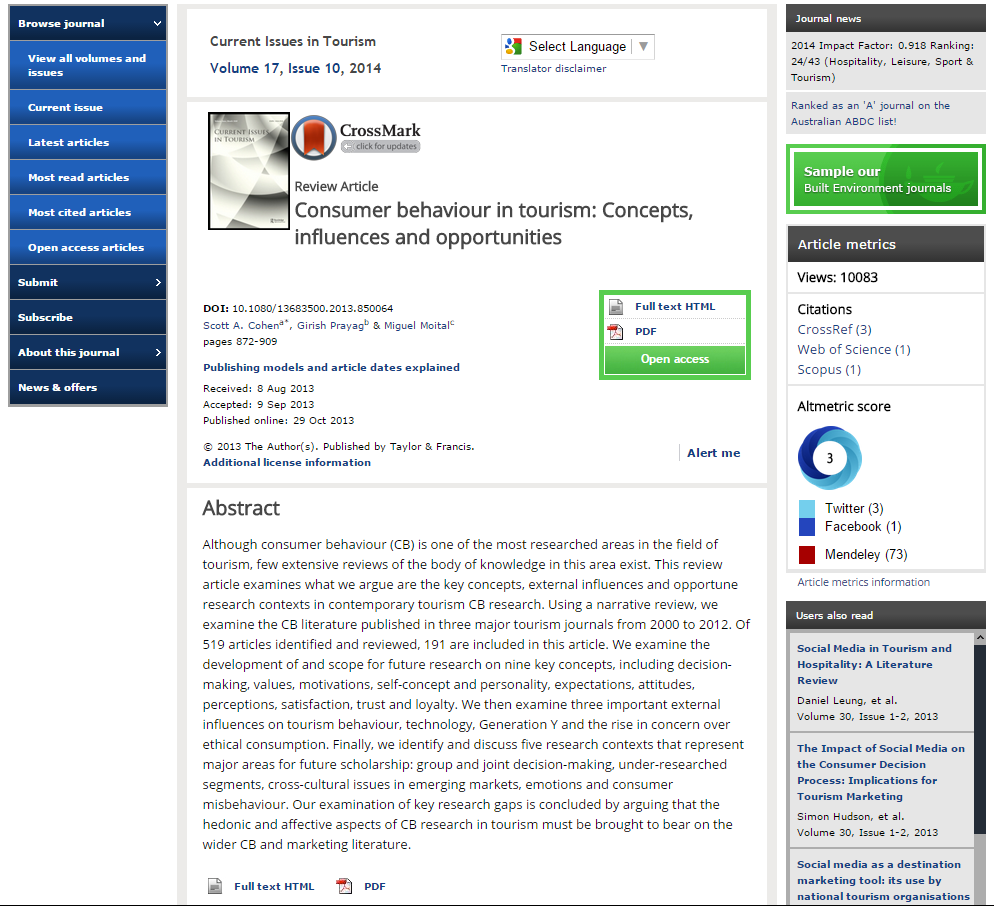
Monday
David Willetts
The former Conservative Universities and Science Minister, David Willetts has criticised the stance of some Conservative colleagues who argue that “too many people go to university”, noting that Tory areas are the main source of the “problem”. David Willetts: Tory areas are ‘culprits’ if too many people go to university. (THE).
Tuesday
Overseas Students
At the Conservative Party conference, the Home Secretary Theresa May spoke about overseas students. She said that if international students do not have a graduate job after their studies, they must return home. She also commented that universities must be responsible for ensuring that overseas students do not stay in the UK without a graduate job. Theresa May: rules ‘must be enforced’ on overseas students. (THE).
Green Paper
The Universities and Science Minister, Jo Johnson has revealed that the higher education Green Paper will be due over the next few weeks. The Green Paper will have a focus on the upcoming Teaching Excellence Framework and will invite responses from the sector and employers. Jo Johnson: TEF will include metrics on widening participation. (THE).
Wednesday
Private School Students
UCAS has accused private-school students of “sleepwalking” through their education, shunning hi-tech subjects such as robotics and bio-engineering in favour of “predictable” careers, following many of their parents into law, banking and the media. Private-school students ‘sleepwalking into predictable careers’ (The Guardian).
TEF and REF
Paul Boyle, Vice-Chancellor of the University of Leicester, argues that the teaching excellence framework should not be divorced from the research excellence framework in a blog post for the Guardian. Don’t let politicians drive a wedge between teaching and research (The Guardian).
Thursday
Overseas Students
Concerns are growing about international students suffering “harsh and unjustified” refusals by Home Office officials after being accepted for admission by UK universities. The UK Council for International Student Affairs (UKCISA), whose membership includes all British universities, says that it has received a “substantial increase in reports of [visa] refusals on grounds of ‘credibility’”. Home Office’s new visa crusade threatens to ‘cut overseas student numbers’ (THE).
Friday
Salaries
According to a report by the Sutton Trust, graduates from Oxford and Cambridge will over their lifetimes earn on average £46,000 annually, compared with £41,000 earned by other Russell Group graduates, and just under £36,000 by graduates from other universities. £10,000 extra a year – the reward of a degree from a top university (The Guardian).
Apprenticeships
Analysis commissioned by the Sutton Trust has revealed that young people who enrol on the highest-level apprenticeships can expect to earn more over the course of their careers than graduates of all but the most prestigious universities. Higher apprenticeships lead to ‘greater earnings than most degrees’ (THE).

ESRC are looking for feedback from early career social scientists (no prescriptive definition given but excluding current Doctoral students) on the experiences and issues they face. Themes covered by the survey include motivations for doctoral study, current employment and future aspirations, availability of support, career advice and guidance – and what support was taken up, and educational background. Selected respondents will be invited to take part in follow-up interviews. The findings will be used to inform ESRC’s support for early career researchers in future years.
Further information is available on the ESRC website http://www.esrc.ac.uk/news-events-and-publications/news/news-items/enhancing-support-for-early-career-social-science-researchers/ and the survey can be found at https://ioe.onlinesurveys.ac.uk/esrc-survey .
 The ESRC website lists its Festival events for 2015 and amongst the interetsing events is a record number of BU events! The full list can be found on the ESRC webpages, click here!
The ESRC website lists its Festival events for 2015 and amongst the interetsing events is a record number of BU events! The full list can be found on the ESRC webpages, click here!
Pathways to impact: part deux!
This event aims to engage participants who attended a previous one-day ESRC Festival of Science event which took place in 2012 entitled, “Pathways to Impact: ageing, diversity, connectivity and community”.
Children will have the chance to take part in a creative mapping exercise using coastal artefacts and pictures to create their own sensory and emotional maps of the topic, starting with the question of ‘how does it make me feel to be here?’
Older people are increasingly at risk of falling victim to financial scams that target vulnerable people, including mass marketing fraud via post, telephone or email and doorstep fraud.
This event will give practitioners, agencies and members of the public, the opportunity to come together to learn more about the threats posed.
This event asked the question:
Bournemouth University Dementia Institute (BUDI) will bring dementia awareness to life through running creative activities including a performance from the BUDI Orchestra – made up of people affected by dementia and musicians – poetry and technology such as IPads and Nintendo Wii.
Are British children disadvantaged compared to children in other Western countries? An analysis of data from global sources compares the standards of mortality, poverty and health funding for children and adults in Britain vs. those in 20 other Western countries.
One year ago, in October 2014, the UK Government introduced major changes to the Copyright Law with the aim of promoting innovation and creativity. These included a range of exceptions and limitations benefiting users as well as educational and cultural institutions.
These exhibitions run over the course of three days presenting a showcase of Bournemouth University research projects demonstrating our research impacts on social and community wellbeing and our concern for diverse groups and work with a wide variety of stakeholders.
A group of researchers from Bournemouth University are researching the lived experience of students entering higher education from and in ‘non traditional’ contexts. By bringing together research, educational practice and students as research co-creators, a unique lens is created through which to observe the question.
The 5-a-day campaign went global after a recommendation from the World Health Organisation that we should all be eating a least 400g of fruit and vegetables per day. Variations on this message are repeated in countries all across the world. But does the message cause more confusion than good?
These exhibitions run over the course of three days presenting a showcase of Bournemouth University research projects demonstrating our research impacts on social and community wellbeing and our concern for diverse groups and work with a wide variety of stakeholders.
These exhibitions run over the course of three days presenting a showcase of Bournemouth University research projects demonstrating our research impacts on social and community wellbeing and our concern for diverse groups and work with a wide variety of stakeholders.
Prof. Edwin van Teijlingen
CMMPH
Communicating Research
FMC Cross-Departmental Seminar Series 2015-16
When: Wednesdays, 3-5 pm
Where: The Screening Room W240, Weymouth House, Talbot Campus,
Bournemouth University, Fern Barrow, Poole, Dorset, BH12 5BB
Wednesday 14 October, 3-4pm
Dr. Rebecca Watkins (Cardiff University) and Dr. Mike Molesworth (University of Southampton)
Title: Digital Possessions
This session will provide an introduction to digital virtual consumption, exploring the emergence of digital consumption objects and the opportunities and issues they present for consumers and for marketers.
Dr. Mike Molesworth is Principal Teaching Fellow at the University of Southampton. Principal Teaching Fellow. He has been lecturing since 1996, for most of that time focussing on online consumer behaviour and emerging consumer cultures. He was a Teaching Fellow in the Centre of Excellence in Media Practice at the Faculty of Media and Communication at Bournemouth University, where amongst other things, he was involved with innovations in online course delivery. More recently he helped set up the Creative Enterprise Bureau, a unique staff/student collaborative consultancy at Bournemouth University, working for clients such as ITV, Channel 4, Toyota and Samsung. With colleagues he has won several best paper awards in journals and at conferences, including my work on digital consumption with Dr Janice Denegri-Knott in Consumption, Markets and Culture, and with Becca Watkins at the international Consumer Culture Theory Conference. He has also won a ‘most cited’ award in Teaching in Higher Education, for his work on the marketisation of Higher Education
Dr Rebecca Watkins is a Lecturer in Marketing at Cardiff University. She holds a PhD in Marketing from the University of Southampton, and a BA (Hons) in Advertising and Marketing Communications from Bournemouth University. Rebecca’s research uses qualitative methods to explore the impact of digital media upon consumer culture, in particular the ways in which notions of owning and possessing are transformed in the context of digital objects. Her work has been published in the Journal of Marketing Management, the Journal of Consumer Culture & Research in Consumer Behaviour, whilst her work in human-computer interaction, in collaboration with the Human Experience and Design research group at Microsoft Research, has been presented at the world’s leading HCI conference.
Wednesday 14 October, 4-5pm
Dr Katy Shaw (Leeds Beckett University)
Title: Financialised Masculinities: Men, Fiction and the Credit Crunch
After the height of the credit crunch, the blame game began, and focus fell firmly on bankers, and male bankers in particular, as being responsible for the crash. Variously dubbed the ‘Man-cession’ or the ‘He-Cession’ by media and political commentators, accusations that an excessively ‘masculine economy’ contributed to the crunch grew in the weeks and months following the economic downturn. Contemporary fiction was quick to respond to the global economic crisis as a source of inspiration for post-millennial narrative. Through this new genre of ‘Crunch Lit’, fiction continued its historical commitment to demystifying the financial world. Examining two case study examples of the new genre – Faulks’ A Week in December (2009) and Lanchester’s Capital (2012) – the paper will interrogate how and why fiction represents the twenty-first century impact of financialisation and its penetration of language, fashion and financial culture to question dominant narratives of the male banker as a new cultural villain for the post-millennial period.
Dr Katy Shaw is Principal Lecturer in Contemporary Literature at Leeds Beckett University. She is also editor of the internationally peer reviewed C21 Literature: journal of 21st-century writings. Her research interests include contemporary writings, working class literatures, regeneration and the languages of comedy. She has published extensively on working class women’s writings, the contemporary novel and twenty-first century literature. Her monograph Crunch Lit examines fictional responses to the global credit crunch.
About the series
This new seminar series showcases current research across different disciplines and approaches within the Faculty of Media and Communication at BU.The research seminars include invited speakers in the fields of journalism, politics, narrative studies, media, communication and marketing studies. The aim is to celebrate the diversity of research across departments in the faculty and also generate dialogue and discussion between those areas of research.
Contributions include speakers on behalf of
The Centre for Politics and Media
The Centre for the Study of Journalism, Culture and Community
Advances in Media Management Research Group
Emerging Consumer Cultures Research Group
Public Relations Research Group
Candida Yates, BA, MA, PhD, FHEA,
Professor of Culture and Communication
Bournemouth University
Faculty of Media and Communication
Weymouth House
Fern Barrow, Poole
Dorset, BH12 5BB
Text Box:
Every year at this time (autumn), the IMF holds large international meetings to highlight and discuss the state of the global economy for its members. The latest sessions, and the World Economic Outlook that supports them, have indicated slower growth this year, averaging 3.1% worldwide – a rate lower than in 2014 (3.4%) and lower than the previous forecast. Prospects are termed “uneven”, with better numbers for the advanced economies and worse ones for emerging and developing countries. Within these broad assessments, however, there is a range of projected experience, with commodity producers hurting and consumer orientated economies doing relatively fine. The IMF concludes, ” In an environment of declining commodity prices, reduced capital flows to emerging markets and pressure on their currencies, and increasing financial market volatility, downside risks to the outlook have risen, particularly for emerging market and developing economies.”
A key issue is how the “Great Recession” has affected the underlying potential to grow in different economies around the world. There is a debate about whether the 2008-10 drop permanently hurt the global growth rate. Nothing is ever permanent in global economics but there is probably a case to say that persistent imbalances in trade, investment – real and financial, and productivity are dampening growth prospects. The sluggish recovery looks set to continue. In response, the IMF, as it often does, calls for infrastructure spending and continued monetary largesse. If only it were that simple.
Following on from a successful pilot, I am delighted to announce the launch of BU’s Undergraduate Research Assistantship (URA) programme. This programme is managed via the Research and Knowledge Exchange Office (RKEO), is funded by the Fusion Investment Fund and offers paid employment opportunities for approximately 55 BU undergraduate students to work in a research position that is directly related to their academic studies or career path, under the guidance of experienced academics, within our clusters, centres and institutes. The programme will enable students to assist academic staff with their research projects as well as provide valuable research experience to enrich their student experience.
In 2015/16, the scheme will be made up of two programmes; a semester-based programme and a summer programme.
Each programme will have a two stage application process; 1) Academic Application Form 1516 and 2) student recruitment for approved URA positions.
These URA vacancies will be available for BU students only, where URA applicants must be able to work in the UK and be enrolled during the time of their assistantship. Staff can only have one active URA application in operation at any one time.
We are now accepting applications from academic staff for URA positions. The closing date for academic applications has been extended to 25th October 2015. Completed application forms should be sent to urap@bournemouth.ac.uk Before submitting your application, please see the following criteria for selecting staff applications for funding.
Please note that applications are now open for both the semester-based programme and the summer programme, with a further round of applications for the summer programme opening in 2016.
If you have any queries, please contact Rachel Clarke, KE Adviser (KTP) on 01202 961347 or email clarker@bournemouth.ac.uk
The first Research Staff Association (RSA) coffee morning will be taking place on Wednesday the 28th October, in the café area of the EBC (Lansdowne Campus) from 10 to 11am.
This is an informal opportunity to meet other research staff over coffee and cake, discuss your work and share ideas for future collaborations. It will also provide an opportunity to make suggestions toward a planned RSA seminar series that will act as a conduit for researchers of the University to showcase their work. For catering purposes please email mheward@bournemouth.ac.uk to confirm your attendance.
We look forward to seeing you there!
Kind regards,
Michelle Heward and Marcellus Mbah (RSA Staff Representatives)
 The current issue of the Nepal Journal of Epidemiology published today carries an editorial by a BU-led team of researchers and development workers. The editorial Mental health issues in pregnant women in Nepal highlights the intervention funded by THET which aims to improve the knowledge and attitude of maternity care workers in a rural district in the south of Nepal. The BU authors include Visiting Faculty: Padam Simkhada, Samridhi Pradham, Jillian Ireland and Bibha Simkhada, the other co-authors are affiliated with the charity we work with in Nepal (Ram Chandra Silwal), the Buddhist charity based in London Green Tara Trust (Padmadharini Fanning), and our Tribhuvan University based colleagues (Lokendra Sherchan, Shyam K Maharjan, and Ram K Maharjan.
The current issue of the Nepal Journal of Epidemiology published today carries an editorial by a BU-led team of researchers and development workers. The editorial Mental health issues in pregnant women in Nepal highlights the intervention funded by THET which aims to improve the knowledge and attitude of maternity care workers in a rural district in the south of Nepal. The BU authors include Visiting Faculty: Padam Simkhada, Samridhi Pradham, Jillian Ireland and Bibha Simkhada, the other co-authors are affiliated with the charity we work with in Nepal (Ram Chandra Silwal), the Buddhist charity based in London Green Tara Trust (Padmadharini Fanning), and our Tribhuvan University based colleagues (Lokendra Sherchan, Shyam K Maharjan, and Ram K Maharjan.
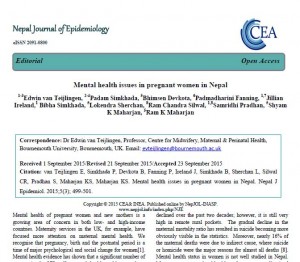 This THET-funded project will involve over 15 UK short-term volunteers. It is important to bring UK volunteers, who as health professionals will bring their experience of, and training in, the provision of mental health and maternity/midwifery services including the area of mental ill health prevention and health promotion. These experienced health workers (such as midwives, family doctors, mental health nurses, health visitors, psychiatrists) from the UK are invited to volunteer for two to three weeks at a time to design and deliver training. The mixture of training staff abroad (= Education) by UK professionals (=Practice) through an intervention which is properly evaluated (=Research) is a perfect example of BU’s FUSION in action.
This THET-funded project will involve over 15 UK short-term volunteers. It is important to bring UK volunteers, who as health professionals will bring their experience of, and training in, the provision of mental health and maternity/midwifery services including the area of mental ill health prevention and health promotion. These experienced health workers (such as midwives, family doctors, mental health nurses, health visitors, psychiatrists) from the UK are invited to volunteer for two to three weeks at a time to design and deliver training. The mixture of training staff abroad (= Education) by UK professionals (=Practice) through an intervention which is properly evaluated (=Research) is a perfect example of BU’s FUSION in action.

This project is supported by the Tropical Health & Education Trust (THET) as part of the Health Partnership Scheme, which is funded by the UK Department for International Development (DFID) and runs from this year May 1st until the autumn of 2016. The paper is freely available on line, click here!
Prof. Edwin van Teijlingen
CMMPH
Refererence:
van Teijlingen E, Simkhada P, Devkota B, Fanning P, Ireland J, Simkhada B, Sherchan L, Silwal CR, Pradhan S, Maharjan KS, Maharjan KS. Mental health issues in pregnant women in Nepal. Nepal J Epidemiol. 2015;5(3); 499-501.
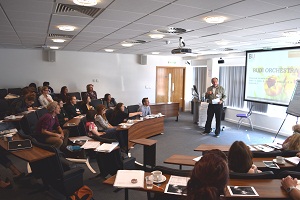
On Wednesday 30th September, the Bournemouth University Dementia Institute (BUDI) hosted a Masterclass on creative approaches in dementia. This was the third in a series of four Masterclasses set for the 2015 calendar year. We provided a day full of information and inspiration on the use of a range of creative activities with people with dementia. The morning included sessions on the importance of engaging people with dementia in creative activities, how much residents in a care home are engaged in meaningful activity on a daily basis, and the use of gardening and nature for wellbeing. As well as presentations from the BUDI team we also benefited from presentations from a professional artist, photographer, poet, and musician.
The afternoon was a series of workshops that gave delegates an opportunity to try out some of the activities and explore how they might facilitate people with dementia and their carers in activities such as music, poetry, visual art, photography, and drama. Such creative arts were used not only to demonstrate how we can engage people with dementia in meaningful activities, and the creative ways that we can make use of the creative arts, but how we can also use the arts to challenge the public’s perceptions of the capabilities of people with dementia.
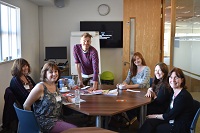
Feedback from delegates has been very positive and we look forward to providing the next Masterclass in a few months!
Next Masterclass:
Wednesday 2nd December:
Promoting Wellbeing at the End of Life
Report by Dr Samuel Nyman, BUDI
‘Communicating Research’
FMC Cross-Departmental Seminar Series 2015-16
Venue: Room PG10, Talbot Campus,
The Faculty of Media and Communication at BU
Time: Wednesdays, 3-5 pm
Bournemouth University, Fern Barrow, Poole, Dorset, BH12 5BB
Wednesday 7 October 2015
Speakers :
Dr Sukhpreet Singh, University of Glasgow and Dr John Oliver, Bournemouth University
‘Innovating and trading TV formats through brand management practices’
Television formats form a major cultural export and yet, there is no protection under copyright law. Format copycats or imitators freely develop game, reality and talent shows based on successful format ideas. Despite this, the format industry has developed an ingenious and complex suite of market based practices that are allowing a thriving format industry to appear. This chapter discusses how TV format makers use brand management practices, in the absence of any legal solutions, to innovate and trade in their products. These include a number of practices such as: developing and managing the format brand identity, developing localized brand extensions and leveraging the producers brand reputation.
About the Series
This new seminar series showcases current research across different disciplines and approaches within the Faculty of Media and Communication at BU. The research seminars include invited speakers in the fields of journalism, politics, narrative studies, media, communication and marketing studies. The aim is to celebrate the diversity of research across departments in the faculty and also generate dialogue and discussion between those areas of research
Contributions include speakers on behalf of
The Centre for Politics and Media
The Centre for the Study of Journalism, Culture and Community
Advances in Media Management Research Group
Emerging Consumer Cultures Research Group
Public Relations Research Group